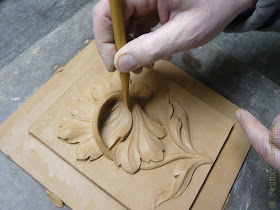Patrick Damiaens
Ornamental Woodcarver
How to
make a plaster ornament.
As was already mentioned in other blog items, plaster models are very important to ornamental woodcarvers.
A
plaster model, as the name already suggests, is a three-dimensional
reproduction of what a certain ornament looks like. For example, they
give the ornamental woodcarver a realistic and tangible feel of the design and
character of a certain style or period.
Since
certain ornaments are typical for a certain style or period, this helps to
ascertain the period of a piece of furniture or a building.
 |
| My workshop |
Due to
their design and tangible presence, models of ornaments play an important role
in the education of any decent ornamental woodcarver. Even the most seasoned
woodcarver can still draw a lot of inspiration from these models.
An ornamental woodcarver is therefore always looking for new models. Whenever I’m abroad, visiting a fellow-woodcarver, I automatically pay full attention to their personal collection of plaster models and other plaster casts that adorn the walls of their workshop.
This represents an enormous wealth of information, which whets the appetite for taking on new woodcarving challenges.
An ornamental woodcarver is therefore always looking for new models. Whenever I’m abroad, visiting a fellow-woodcarver, I automatically pay full attention to their personal collection of plaster models and other plaster casts that adorn the walls of their workshop.
This represents an enormous wealth of information, which whets the appetite for taking on new woodcarving challenges.
Especially when I visit the
woodcarver workshop “l’Ecole Boulle” in Paris, where the walls are absolutely
plastered with beautiful “goodies”, I’m completely overtaken by this greedy
sensation, making me think “I want that one” or “how I wish that one was mine”.
The only solution at a time like this is to take as many pictures as possible.
This
helps you to create an extensive educational archive; a useful personal archive
that you can consult whenever you want.
 |
| l'école Boulle in Paris |
As I
mentioned earlier, there is no substitute for “the real thing”. Plaster
ornaments and other plaster casts are essential to the education of any
woodcarver, who takes his profession seriously.
Sketches
and photographic material (especially taken with a digital camera) are starting
to play a bigger role and have become increasingly more important in the quest
for knowledge, but are by no means real substitutes for plaster models.
 |
| l'école Boulle in Paris |
Why did
ornamental woodcarvers start using plaster ornaments?
Back in
the day, when a woodcarver was commissioned to create a decoration or ornament,
the design was first moulded in clay and shown to the client so that he or she
could decide whether or not the design was to his or her liking.
One
would think that a woodcarver could basically use this clay model to start
working on the wooden ornament. Unfortunately, the clay would dry out and start
cracking. Pieces would fall off, making this a very inefficient model to use: not
then, not now, not ever.
The solution was finally found by first making a mould of the clay model, which was then filled with plaster: the plaster model was born.
The solution was finally found by first making a mould of the clay model, which was then filled with plaster: the plaster model was born.
This was
more durable and because of the hardness of the plaster, the woodcarver was
able to take measurements for his workpiece. This method was also used to
create basic ornaments in plaster, to serve as a model and a source of
inspiration for apprentices.
This
work method is still very relevant and therefore I also apply it during the education
of my students.
-------------------------------------------------------------
How to
make a plaster ornament
Tangible
models for woodcarvers
In this
blog item, I introduce you to the different stages of making a leaf-shaped plaster
model.
 |
| Ornament Drawing |
 |
| The modeling of the ornament in clay |
 |
| Making a silicon mold |
 |
| The silicon mold is ready |

 |
| Casting a plaster ornament |

 |
| The leaf-shaped ornament is finished |
Course
in woodcarving – ornamental carving
I’ve been teaching professional courses on the subject of the creation and
carving of ornaments for 15 years now. This class – a course on “woodcarving -
Liège ornaments” – has been successfully taught in Tongeren, (Limburg, Belgium)
for many years now.
Every
assignment or technique is executed in wood by me personally. These wooden
panels or models are then used to create silicon moulds, so that the student
has the opportunity to make his own plaster cast to serve as an example when
working on his assignment in wood. The plaster casts are an important source of
inspiration for the student, seeing as woodcarving is not only learned by doing,
but also by observing and constantly being confronted with models and designs.
For
the moment, we have approximately 150 different models. Should you be
interested in acquiring one of our educational ornaments,
please feel free to contact us.
 |
| https://www.patrickdamiaens.info |








No comments:
Post a Comment